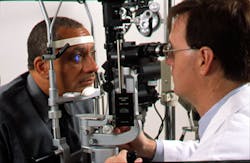The Federal Motor Carrier Safety Administration is proposing to reduce or eliminate the required intrastate driving experience with a stable vision condition as a criterion for its vision exemption program. In a Federal Register notice published Dec. 18, the agency, however, proposed to tighten some other criteria for the program, which since 1998 has allowed drivers who don’t meet vision standards to drive commercial motor vehicles under certain conditions. Comments on the proposal are due Jan. 17.
A 2006 study of the medical exemption program suggested that the current requirement for three years of intrastate driving experience with the visual deficiency aren’t necessary to preserve safety, FMCSA said. The agency has proposed two options: (1) driving with a stable vision condition for at least one year while operating a CMV in intrastate commerce; or (2) removing the driving experience requirement altogether.
Reducing the requirement to one year would still allow a period of time to verify safe driving and accurate records, FMCSA said. On the other hand, not all states allow intrastate driving with a visual deficiency, so retaining any requirement for intrastate experience could disqualify someone who otherwise would be a safe interstate CMV driver, the agency noted. Removing the driving experience requirement entirely would be consistent with the principles of FMCSA’s diabetes exemption program. Under that option, FMCSA would ask for an examination by the ophthalmologist or optometrist to be reported within the last three months from the date of application to avoid the risk of recent deterioration.
Among the tighter proposed standards is barring drivers who have had convictions in the past three years for “major offenses” as defined in part 383.51 (b) - such as being under the influence of alcohol or controlled substances, operating under a suspended license or using a CMV in committing a felony, among others – in addition to “serious traffic violations” under the current exemption criteria.
FMCSA also proposes to require drivers seeking a vision exemption to undergo a medical exam and obtain a medical examiner’s certificate that the driver is physically qualified to drive if the certificate is accompanied by a federal vision exemption. Currently, the criteria require only that the driver sign a statement acknowledging that he must be otherwise qualified to operate a CMV in interstate commerce. As with the proposed option to eliminate the driving experience requirement, this change is consistent with the diabetes exemption program, FMCSA said.
Current criteria also disqualify drivers who have been involved in an accident where the driver’s actions were a contributing factor or the driver received a citation for a moving traffic violation. FMCSA proposes to define “accident” as it is defined in part 390.5.
